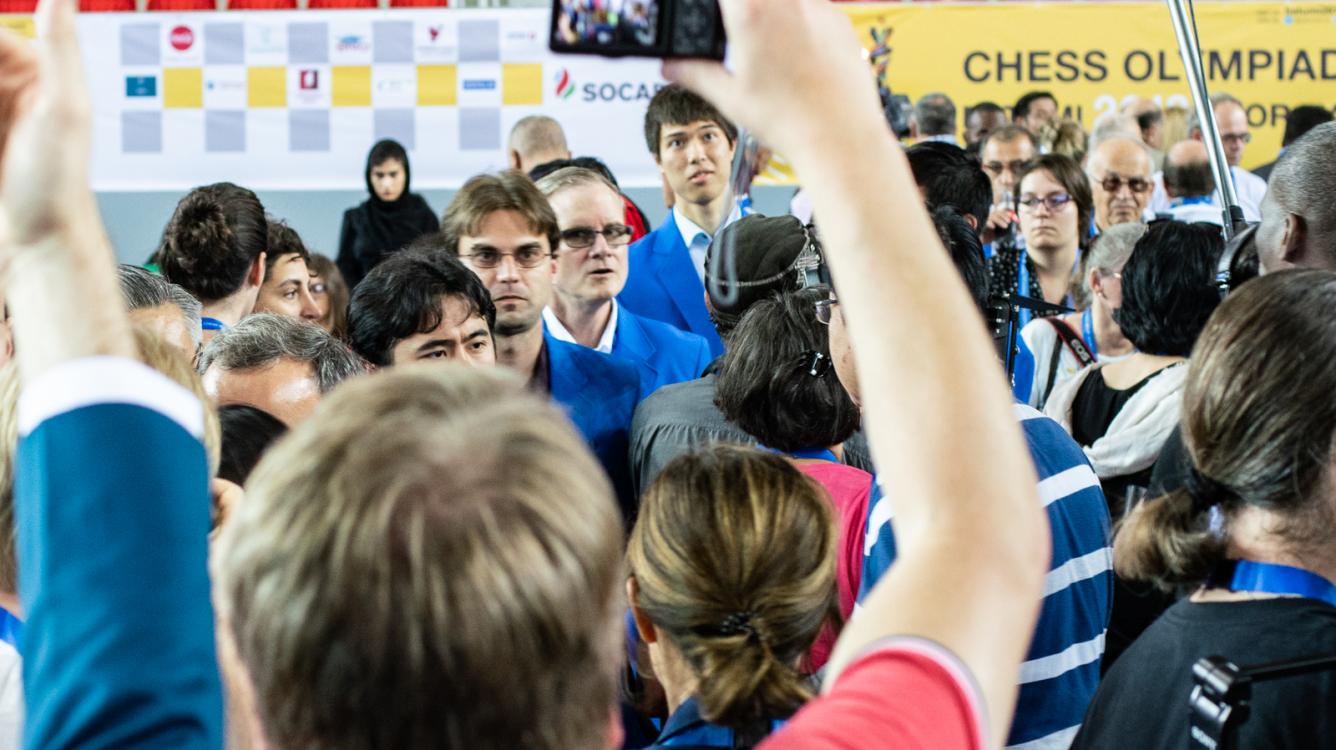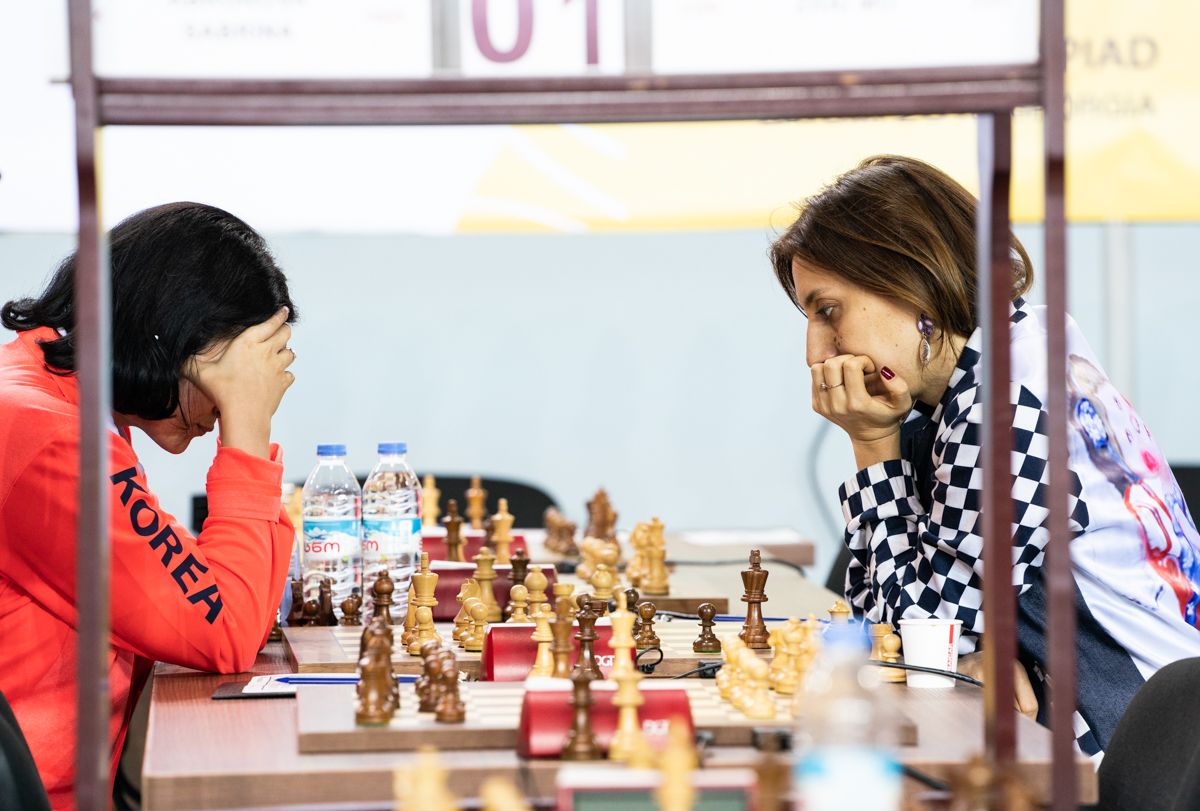
Chess Olympiad: 7 Minutes Of Tension In 1st Round
Olympiads usually offer several nuggets every two years: Worthy champions, Bermuda party excesses, and round-one upsets. But at the 2018 Chess Olympiad in Batumi, Georgia, the opening games in both the open and women's sections didn't produce a single flipped team result from the expected.
In the open section, the biggest story lasted not hours, but minutes. The gold-medal defending team USA had not arrived at their boards at the scheduled starting time of 3 p.m. Nor had any of the team been seated by 3:15, when the round was officially opened by Chief Arbiter Takis Nikolopoulos. The default period, which curiously still has "zero tolerance" in its name, is still 15 minutes. But at 3:22 p.m., team USA arrived in matching blue blazers, shook hands with their opponents while still standing, and duly set about their title defense by going 4-0 against Panama.

USA arriving at their boards. | Photo: Maria Emelianova/Chess.com.
U.S. team captain IM John Donaldson, known for his attention to detail (in the past he's examined flight patterns over his team's hotel to make sure they will have restful nights), told Chess.com that they left their hotel on one of the provided shuttle buses at 2:15. The bus arrived at 2:35 but due to a holdup at the players' security entrance, they didn't gain access to the playing hall until about 50 minutes later. Crowds were noticed by Chess.com staff today, but journalists used a different entrance today and did not experience delays.

Donaldson, reading Robert Crais’ "Chasing Darkness" during the round. | Photo: Maria Emelianova/Chess.com.
While this was happening, Nikolopoulos leaned over to the captain of the Panamanian team and informed her that the team was "stuck in traffic." That turned out to be true; it was just a traffic jam of people.
GM Zurab Azmaiparashvili, member of the Olympiad state commission, held a brief press conference and explained the stress of hosting the Olympiad.
"If you ask me would I organize one again? I would say no," he said. He then asked for patience for any of the issues experienced in round one, promising they will be worked on for future games.
Chess.com asked about the specific incident on board one, and Azmaiparashvili said, "This is the first round of course. People are probably not so experienced to assist." Then when informed that the Americans did not get their seven minutes back on the clock, he said, "I'm very surprised."

Organizers Zurab Azmaiparashvili (left) and Giorgi Giorgadze, with FIDE's acting president Georgios Makropoulos in the middle. | Photo: Maria Emelianova/Chess.com.
What's not surprising? GM Hikaru Nakamura winning, and with some extra flash on the ending. He made up for the late arrival with this 25-move win below.
We also now know the board order for the defending champs: GM Fabiano Caruana's flight landed late last night so he sat out today, but he will resume duties like in 2016 on board one. Nakamura will normally drop down to board three, swapping places with GM Wesley So, who inherits board two when Caruana plays.
As is typical for the Swiss pairing system at Olympiads, strong countries faced much weaker countries today. Several individuals scored personal successes, but none of the underdog federations could score the needed 2.5 to make memories for the whole team. None of them could even score a 2-2 draw.
As for single moments of greatness, one Moroccan had his day in the sun. CM Mohamed-Mehdi Aithmidou will pour his mint tea extra high tonight after beating GM Li Chao, a player nearly 500 points higher (China still won 3-1). If drawing world-class GMs counts as an upset (and for many here in Batumi, that certainly does), then Zambian IM Andrew Kayonde and Japanese IM Shinya Kojima held two other well-known grandmasters to draws: GM Vassily Ivanchuk an GM Gabriel Sargissian, respectively.
But there was nothing today like the last event in 2016, when the likes of Sudan held the formidable Bulgarian squad to a 2-2 match tie in round one. Indeed, Bulgaria is not even here in Batumi due to federation issues, so that result really can't possibly repeat.
One reason it's harder to surprise the big guns? You never know if up-and-coming players have already become "known" players. For example, you might think GM Anish Giri would have little insight to his 2300-rated opponent, but as he told Chess.com, team captain GM Jan Gustafsson actually had some prior working knowledge to share! Chalk one up for recruiting such a useful member to your team.
Chess.com's interview with Giri.
Here's that big upset, with Li Chao going down on board four in 87 moves. At first it looks like the underdog was trying the age-old but often faulty strategy of trying to trade everything against a higher-rated player. That backfired, but then Li Chao went for a positional bind instead of grabbing material. The Moroccan then had to fight, and he did just that, unraveling himself and after a circuitous path, finally advancing his connected passers to victory.
The ultimate blunder seems to have happened to Lithuania's top player. Was that blunder resigning in an equal position, or flagging right on the time control? Chess.com isn't sure, but whichever happened, it cost him the game (he had a little more than three minutes to make the final move before time control, so it seems it may have been the former).

Chessbrahs Yasser Seirawan and Robin van Kampen, who were giving commentary on Chess.com/TV today (and every day), saw co-brah GM Aman Hambleton lose to CM Rijendra Rajbhandari (1937). | Photo: Maria Emelianova/Chess.com.
Chess.com's interview with another Chessbrah, Eric Hansen.
In the women's section it was a similar story, with no upsets in terms of overall results, but there were a few surprising results on individual boards. Here are the major ones:
- IM Lela Javakhishvili (2475), board two of the Georgian team, lost to South Korea's WFM Roza Eynula (2030).
- France's board three IM Sophie Milliet (2389) lost to WCM Rozana Gjergji (1924) of Albania.
- WIM Anna Warakomska (2305), board four of Poland, lost to WIM Silvia Carolina Mazariegos (1922) of Guatemala.
- WGM Sabina-Francesca Foisor (2311, board three USA) lost to WFM Andreina Quevedo (1809) of Uruguay.
- Israel's board four WFM Michal Lahav lost to Misaki Shibata (1605) of Japan.
Javakhishvili fell for a tricky tactic that wasn't easy to spot. It didn't harm much, as Georgia won on the other three boards.

Eynula vs Javakhishvili. | Photo: Maria Emelianova/Chess.com.
Gjergji did a decent job in winning a Q-vs-R ending against Milliet, although she will probably smile when she finds out that she missed a mate in one in the process.
Foisor can't be too upset because her opponent did play an excellent game. One wrong choice, and White was overrun completely on the kingside in a typical King's Indian attack.

Foisor resigns her game. | Photo: Maria Emelianova/Chess.com.
It was good to see India's Humpy Koneru returning to classical chess for the first time in two years following motherhood. She comfortably outplayed New Zealand's Helen Milligan (1942) from a Classical Pirc.
Games via TWIC.
The general feeling from the playing hall after the first day is that everyone was quite impressed about the opening ceremony, but slightly less so about the playing conditions. For many, it was a surprise to find out that not everyone is playing in the same hall; the playing area is actually divided in two separate halls—something that hasn't happened at an Olympiad since Calvia 2004.
It's a bit of a walk in between the two halls (the outdoor corridor is about 100 meters), which became a bit unpleasant about 30 minutes into the round when the three refrigerators in the biggest of the two halls were already empty.

The corridor between the two playing halls. | Photo: Maria Emelianova/Chess.com.
GM Elshan Moradiabadi (team captain of Papua New Guinea) and others were spotted carrying several bottles of water from playing hall one to playing hall two. Later in the day, the drink supplies were filled up again.
The biggest of the two halls is a giant, cubic, metal, makeshift arena without a spectator area. It's where most of the teams play, and spacious enough, although not everyone is happy with the air circulation.
The smaller hall is a sports complex with seats all around that provide good viewpoints for spectators. The playing area itself, however, is rather cramped, especially compared to the Baku 2016 and Istanbul 2012 Olympiads.
The Expo area is not very big either this time. Presidential candidates Arkady Dvorkovich and Georgios Makropoulos both have a stand; Nigel Short does not. All three made their appearance in the playing hall today.

The election booth of Makropoulos. | Photo: Maria Emelianova/Chess.com.

The election booth of Dvorkovich. | Photo: Maria Emelianova/Chess.com.

Some players already picked up some goodie bags. | Photo: Maria Emelianova/Chess.com.

Lots of media for Georgia's board-one player Baadur Jobava. | Photo: Maria Emelianova/Chess.com.

Russia's legendary photographer Boris Dolmatovsky in action.
Peter Doggers contributed to this report.


